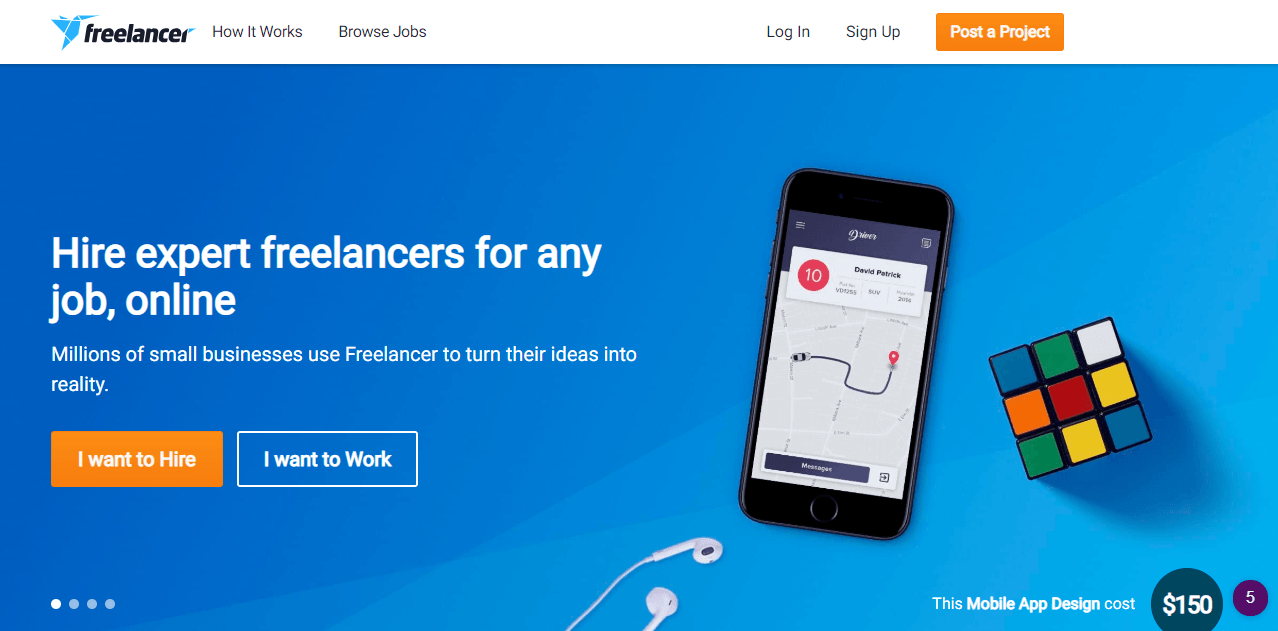

Quick Links
Quick Links

Working remotely has become increasingly popular over the last few years. With the ability to connect through technology, the need to be located near clients or customers is becoming less and less of a requirement. For many people, working remotely can be a rewarding experience that allows you to make your own hours, determine your own income, and have the flexible work-life balance we’re all looking for.
Taking the step to become a freelancer can be a major decision. But, finding remote work online and working from home has never been easier. There is an endless need for outsourced content creation, web design, mobile app development, and a host of other skills and services.
Whether you are new to freelancing or growing your business, building a client base used to be daunting. But now it’s easy — and quick — to find remote work online if you know where to look and how to market yourself.
Here are our top 20 tips for finding and landing your next client, and how to let remote work fit into your lifestyle.
1. Identify Your Specialties
The first step in starting to freelance is identifying what you have to offer. What do you do best? What do you like to do? Identify a few types of freelance work that you’d like to explore. This will help as you narrow your searching process.
It also helps to identify your subject matter expertise. What industries do you know? Which corporate languages can you speak? As you search for freelance work, if you look for work within your expertise areas, you will have a leg up over other freelancers who have to learn the lingo.
2. Create Work Samples
Anyone looking to hire a freelancer wants to see evidence of the work they will be paying for. Landing your first project without any work samples can be tough. Gather some of your best past work, or create sample work to use when marketing your services. Chose samples that best represent the type of work you’re looking to take on, or industries you will target in your search.
3. Create a Professional Online Portfolio
Whether you’re just starting out as a freelancer, or are a freelancing veteran, it’s important to display your skills in a professional portfolio. When you’re looking for remote work online, prospective clients will expect to see your capabilities and past work you’ve completed.
To share this information with clients, many freelancers create a portfolio website. Include past work, work samples, a list of services you can provide, and remember to continue to add examples as you complete projects.
It may also help to include basic personal information such as your location, years of experience, hobbies, and a photo. These details humanize you and allow your potential clients to make a connection that sets you above your competition.
4. Create a Resume Focused on Remote Work
While your online portfolio will house all of your work samples, many clients looking for a freelancer will first request a simple resume. Resumes are typically easier to wade through than portfolio sites and provide insight into your work experience to prove you know what you’re doing.
While you may already have a resume from your last traditional job, creating a resume for remote work is different. Be sure to focus on traits clients need in a freelancer such as trustworthiness, attention to detail, transparency, ability to communicate, organization, ability to follow directions, and capacity to meet deadlines.
5. Use Online Networks to Make Connections
Successful freelancers with ample online work maintain a robust LinkedIn profile, and create thorough profiles on freelancing platforms. Use these platforms to engage potential clients, past clients, and network with other freelancers. These connections may lead to more work, follow-up work, or pass through work from others who are too busy. As you share interesting articles and work of your own, your online profiles will also help support your credibility.
6. Tap into Your Existing Connections
One of the quickest ways to find freelancing work online is to reach out to your existing network. Let your connections know you’re available for remote work by posting on LinkedIn, Facebook, Twitter, and sending emails to people in your network who may need your skills.
Do you have family or friends that own their own businesses, or small owner-operated businesses in your community? Offer your services locally to people you know to jump start your freelance career.
7. Connect with Other Freelancers
In addition to building connections with potential clients, use the accounts you set up on these freelance platforms to find other freelancers. As you work to perfect your process of searching for remote work, you may come across projects that are great opportunities, but not right for your skillset. Other freelancers see the same thing. If you build a network with others, you can share remote opportunities with others and be available when they can return the favor. Connect with other freelancers through social media groups, local coworking spaces, or your new portfolio on freelancing sites.
8. Get Involved in 5+ Freelancer Platforms
When clients need freelance help, they often post their remote projects on a freelancing platform like FreeeUp, Upwork, TopTal, and other marketplaces. There are millions of freelance opportunities on these networks. By creating and maintaining a presence on these platforms, you can find, apply, and get hired for remote work quickly.
9. Identify the Best Platforms for You
Countless websites exist to help you search for and find freelance work. Many allow you to search for specific types of work, specific industries, or contract terms. Others also allow you to advertise yourself so clients can reach out to you.
If you complete a general search online for remote work, you can easily get overwhelmed. So, how do you narrow down the results and find the best remote work for you?
These are the top five freelancing platforms we recommend. Weigh these pros and cons to find the best platforms for you.
Fiverr
Fiverr is a network that prides itself on connecting clients with freelancers from a variety of business services—from data entry and bookkeeping to graphics design and content creation. As the name implies, these services start for as low as five dollars, so Fiverr is good for freelancers just starting out and offering low-cost services, or freelancers who like to do quick, one-off projects.
Freelancer
Freelancer has been around for over a decade and hosts over 8 million remote projects in numerous categories, making this site one of the biggest websites for freelancers. Unlike many platforms, Freelancer does charge a fee for membership, which gets you access to project listings and all the features of the site.
FreeeUp
FreeUp is a marketplace of pre-vetted freelancers with skills in marketing, web development, ecommerce, virtual assistance, and more. If you’re approved as a freelancer on FreeeUp, you can find remote work incredibly quickly. Unlike other networks, there’s no bidding, no applying, and the process moves quickly. Most requests are filled within 24-48 hours, so you can find freelancing work with speed.
Upwork
Upwork is possibly one of the most recognized freelancing platforms for finding remote work. When you find a project that interests you and matches your skills, you submit a proposal. Clients review the proposals they receive (often hundreds) and choose a freelancer that meets their needs.
TopTal
TopTal has a tremendously strict screening process for new freelancers, but rates you can charge are among the highest in the industry. For experienced freelancers, TopTal is a great option for finding remote work. For those new to freelancing, you’ll need to wait until you have sufficient experience under your belt before you apply.
10. Write Professional Introduction Emails
When you’re trying to find remote work, a lot of your communication will happen by email and Skype. It’s best practice to write a professional introduction email to potential clients to introduce yourself and your services. You can include a link to your professional portfolio to show off your skills and past work. You want to make an impression, and your email should mimic the type of work you can offer.
11. Follow up with Leads
Many times, when clients are searching for a freelancer it is because they want options. You are most likely not the only one selling your services. After your introduction email, be prepared to follow up. Your first message may not get a response, so be persistent without being overbearing.
12. Be Yourself in the Interview
Some clients will request a phone or video interview before trusting you with their assignment. Don’t be afraid to be yourself. These call or video interviews are often less pressure than in person interviews, but they can still be stressful if you really want to land the project. Try to relax, talk about your past successes, and convince them you can be trusted with their outsourced work.
13. Complete Work on Time and on Budget
As you grow your freelancing business, some of your work will come from repeat clients. To ensure your clients think of you first for their next project, be diligent about completing work on time, on budget, and according to the client’s specifications. Make a good impression, and clients will choose you over a new freelancer with a learning curve the next time around.
14. Ask Clients for Referrals
If you have a freelance client base, you can find more remote work quickly by asking them for referrals. There are several ways to accomplish this. You can ask for a testimonial for your portfolio site and LinkedIn profile. You can also ask them to connect you with anyone in their network who may need your services with a warm introduction email.
15. Identify Your Niche
When you first begin freelancing, it’s tempting to take every project that comes your way. As you grow your client base and find the need to narrow down the work you’ll take to fit into your schedule, you have a choice to make.
What will be your specialty? What do you enjoy doing? What is the most efficient for you to complete? By identifying your niche, it will guide your search for a continuous stream of work, and help you narrow down which projects make you the most income for your time.
16. Make Time for Learning
 As you become more experienced in freelancing, it will be easy to fall into a habit of taking on work within your current areas of expertise. To get the most out of your freelancing experience, it may benefit you to branch out into new industries or service areas.
As you become more experienced in freelancing, it will be easy to fall into a habit of taking on work within your current areas of expertise. To get the most out of your freelancing experience, it may benefit you to branch out into new industries or service areas.
By expanding your horizons, you bring additional experience to your work that other freelancers may not have. A well-rounded knowledge of industries and services adjacent to your specialties will allow you to branch out and cast a wider net for more work.
If you need more knowledge in other industries or service areas, make time for it. You can find many sources for online learning, both free and paid. Continued learning will help you become better at your craft, and provide relief from a constant stream of work.
17. Set Boundaries That Work for You
Because freelancing provides so much schedule freedom, there is a tendency to either over or under work. If you are someone who has great internal motivation, it may be hard to shut off the work at the end of the day. If you are someone who needs external motivation, it may be hard to get into a routine of working on client work each day.
Either way, it is important to set boundaries. Think about your lifestyle, and the schedule work fits into. Do you like to get up early and get work done as you have your morning cup of coffee? A traditional 9-5 workday might be for you. Do you like to sleep in and gradually ease into the day after taking care of other household chores in the morning? You might need a schedule with more afternoon and evening hours.
It may take some trial and error, but with freelancing, you are in control. Find the schedule that works for you and line up work that corresponds with that schedule.
18. Identify Your Ideal Work Location
If you choose to do most of your freelancing work from home, it can be tempting to check household chores off the list during the day.
For many freelancers, it helps to have a designated work space that is used for only work. It’s not the same as going to an office, but it helps shut out those nagging chores and other responsibilities.
Many freelancers who work from home also find themselves missing social interaction. Try working from your local coffee shop for a day. If it’s a nice summer day, try working in the park. Getting out of your regular home/work environment can help spur creativity and break up the monotony.
19. Stick with It
Freelance work can be a roller coaster with highs of too much work, and lows of not enough work during slow periods of the year. But, stick with it. Building a client base in the freelance world can take time, but as you make an impression on your clients and continue to do good work, there will be plenty of work coming your way on a steady basis.
20. Take Care of Yourself
Just like in a traditional job, it’s important for freelancers to take breaks. Make it a priority to schedule holiday breaks, vacations, and allow time for unforeseen circumstances like health issues or loss of loved ones. Don’t neglect your family, friends, or yourself in lieu of all the freelance work you find using these tips.
Conclusion
Freelancing can be a rewarding career which allows you to make your own hours and determine your own success. With these tips, you now know how to find remote work, market yourself for continued work, and make your freelancing experience rewarding and valuable.
There are plenty of options for finding remote work quickly online, and these tips will put you on the right path to identifying which platforms work best for you. If you’re looking to build your client base, apply to join the FreeUp marketplace today.







